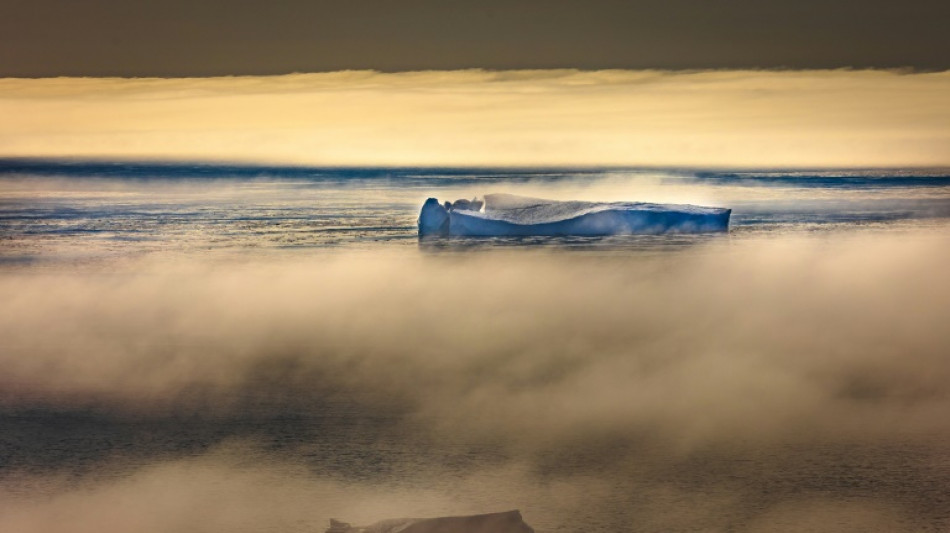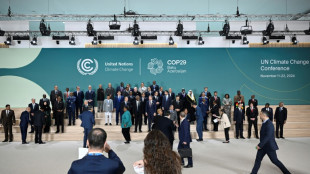
-
 Palestinian pottery sees revival in war-ravaged Gaza
Palestinian pottery sees revival in war-ravaged Gaza
-
Main points of the $300 billion climate deal

-
 Robertson wants policy change for overseas-based All Blacks
Robertson wants policy change for overseas-based All Blacks
-
Israel retreat helps rescuers heal from October 7 attack

-
 Afghan women turn to entrepreneurship under Taliban
Afghan women turn to entrepreneurship under Taliban
-
Mounting economic costs of India's killer smog

-
 At climate talks, painstaking diplomacy and then anger
At climate talks, painstaking diplomacy and then anger
-
Uruguayans head to polls with left hoping for comeback

-
 Trump's mass deportation plan could end up hurting economic growth
Trump's mass deportation plan could end up hurting economic growth
-
Iran director in exile says 'bittersweet' to rep Germany at Oscars

-
 US consumers to bargain hunt in annual 'Black Friday' spree
US consumers to bargain hunt in annual 'Black Friday' spree
-
Cheers, angst as US nuclear plant Three Mile Island to reopen

-
 Scientists seek miracle pill to stop methane cow burps
Scientists seek miracle pill to stop methane cow burps
-
Australia ditches plans to fine tech giants for misinformation

-
 Developing nations slam 'paltry' $300 bn climate deal
Developing nations slam 'paltry' $300 bn climate deal
-
Red Bulls win 'Hudson River derby' to reach conference final

-
 Neuville wins world title after Tanak crashes at Rally Japan
Neuville wins world title after Tanak crashes at Rally Japan
-
Neuville wins world rally title after Tanak crashes in Japan

-
 Colapinto cleared for Las Vegas GP despite heavy crash
Colapinto cleared for Las Vegas GP despite heavy crash
-
'Smiling One' Amorim vows he has ruthless streak Man Utd need

-
 Marseille down Lens to stay in touch with Ligue 1 leaders, Lyon draw
Marseille down Lens to stay in touch with Ligue 1 leaders, Lyon draw
-
New Zealand beat 'proud' Italy in Cane's Test farewell

-
 Barca collapse in Celta draw without Yamal, Simeone hits milestone
Barca collapse in Celta draw without Yamal, Simeone hits milestone
-
Thailand's Jeeno equals Yin for lead at LPGA Tour Championship

-
 New Zealand beat Italy in Cane's Test farewell
New Zealand beat Italy in Cane's Test farewell
-
Marseille down Lens to stay in touch with Ligue 1 leaders, Lyon held to draw

-
 Liga leaders Barca suffer late collapse in Celta draw
Liga leaders Barca suffer late collapse in Celta draw
-
Retegui fires Atalanta top of Serie A ahead of Inter

-
 Greaves hits maiden Test century as West Indies dominate Bangladesh
Greaves hits maiden Test century as West Indies dominate Bangladesh
-
Venezuela opposition calls for mass anti-Maduro protest on Dec. 1

-
 'Fragile' Man City in uncharted territory, admits Guardiola
'Fragile' Man City in uncharted territory, admits Guardiola
-
Erasmus hails Springbok strength in depth after thrashing Wales

-
 Postecoglou calls for consistent Spurs after Man City rout
Postecoglou calls for consistent Spurs after Man City rout
-
'We've never lived this situation' admits Guardiola

-
 Lebanon says more than 55 killed in Israeli strikes
Lebanon says more than 55 killed in Israeli strikes
-
'We've never lived this situation' admits Guardiola as Man City lose five in a row

-
 Under-fire Gatland 'motivated' to continue as Wales coach
Under-fire Gatland 'motivated' to continue as Wales coach
-
South Africa send Wales crashing to 87-year low in Test rout

-
 Spurs condemn Man City to fifth straight defeat as Arsenal win
Spurs condemn Man City to fifth straight defeat as Arsenal win
-
Defeated Leipzig lose more ground on Bayern, Frankfurt go second

-
 South Africa put Wales to the sword to wrap up season
South Africa put Wales to the sword to wrap up season
-
Spurs thrash Man City 4-0 to end 52-match unbeaten home run

-
 Defeated Leipzig lose more ground on Bayern
Defeated Leipzig lose more ground on Bayern
-
Venezuela opposition calls for 'enormous' anti-Maduro protest

-
 Inter take Serie A lead as AC Milan and Juve bore in stalemate
Inter take Serie A lead as AC Milan and Juve bore in stalemate
-
England captain George wary of Jones's influence on Japan

-
 Thousands demand lower rents at Barcelona demo
Thousands demand lower rents at Barcelona demo
-
'Puzzle' master Sinner powers champions Italy back into Davis Cup final

-
 Odegaard inspires Arsenal to reignite title hopes
Odegaard inspires Arsenal to reignite title hopes
-
Marseille down Lens to stay in touch with Ligue 1 leaders


Arctic could be ice-free a decade earlier than thought
The Arctic Ocean's ice cap will disappear in summer as soon as the 2030s and a decade earlier than thought, no matter how aggressively humanity draws down the carbon pollution that drives global warming, scientists said Tuesday.
Even capping global warming at 1.5 degrees Celsius in line with the Paris climate treaty will not prevent the north pole's vast expanse of floating ice from melting away in September, they reported in Nature Communications.
"It is too late to still protect the Arctic summer sea ice as a landscape and as a habitat," co-author Dirk Notz, a professor at the University of Hamburg's Institute of Oceanography, told AFP.
"This will be the first major component of our climate system that we lose because of our emission of greenhouse gases."
Decreased ice cover has serious impacts over time on weather, people and ecosystems -- not just within the region, but globally.
"It can accelerate global warming by melting permafrost laden with greenhouse gases, and sea level rise by melting the Greenland ice sheet," lead author Seung-Ki Min, a researcher at Pohang University of Science and Technology in South Korea, told AFP.
Greenland's kilometres-thick blanket of ice contains enough frozen water to lift oceans six metres.
By contrast, melting sea ice has no discernible impact on sea levels because the ice is already in ocean water, like ice cubes in a glass.
But it does feed into a vicious circle of warming.
- Three times faster -
About 90 percent of the Sun's energy that hits white sea ice is reflected back into space.
But when sunlight hits dark, unfrozen ocean water instead, nearly the same amount of that energy is absorbed by the ocean and spread across the globe.
Both the North and South Pole regions have warmed by three degrees Celsius compared to late 19th-century levels, nearly three times the global average.
An ice-free September in the 2030s "is a decade faster than in recent projections of the Intergovernmental Panel on Climate Change (IPCC)", the UN's science advisory body, said Min.
In its landmark 2021 report, the IPCC forecast with "high confidence" that the Arctic Ocean would become virtually ice-free at least once by mid-century, and even then only under more extreme greenhouse gas emissions scenarios.
The new study -- which draws from observational data covering the period 1979-2019 to adjust the IPCC models -- finds that threshold will most likely be crossed in the 2040s.
Min and his colleagues also calculated that human activity was responsible for up to 90 percent of the ice cap's shrinking, with only minor impacts from natural factors such as solar and volcanic activity.
The record minimum sea ice extent in the Arctic -- 3.4 million square kilometres (1.3 million square miles) -- occurred in 2012, with the second- and third-lowest ice-covered areas in 2020 and 2019, respectively.
Scientists describe the Arctic Ocean as "ice-free" if the area covered by ice is less than one million square kilometres, about seven percent of the ocean's total area.
Sea ice in Antarctica, meanwhile, dropped to 1.92 million square kilometres in February -- the lowest level on record and almost one million square kilometres below the 1991-2020 mean.
W.Lapointe--BTB



